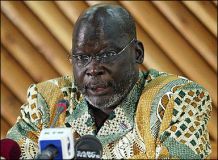Sudan’s Garang faced with new challenges
By ELIUD MIRING’UH, The Standard
NAIROBI, Apr 25, 2005 — John Garang de Mabior, the designated first Vice President of New Sudan and leader of the Sudanese Peoples’ Liberation Movement (SPLM), is obviously a man on the spot.

|
|
Chairman of the Sudanese People Liberation Movement (SPLM) John Garang, addresses delegates at a major reconciliation conference in Nairobi, April 19, 2005. (AFP). |
For even after emerging victorious last January 9, when he signed a comprehensive peace agreement (CPA) with his former enemies from Khartoum, the challenges facing his people of the south are far from over.
Violence has broken out among various factions in the south who are fearful that under an SPLM government, their rights may not be recognised while others are demanding for equal distribution of resources.
Former President Moi greets Sudanese first vice president Dr John Garang during the closing ceremony of the south-south forum in Nairobi, last week, which was sponsored by the Moi Africa Institute.
Sporadic conflicts among various factions in the south is not a new phenomenon, but the world attention has for many years been focussed on the battle between SPLM and the Arabs in Khartoum to a level where differences among the southerners have hardly attracted keen attention.
Some of the southerners, formerly opposed to SPLM have landed key cabinet appointments in the government of President Mohamed El Bashir, an obvious example being the current second Vice President, Prof. Moses Machar.
But the signing of CPA between SPLM and the Sudanese government was largely seen as a major victory for the southerners, majority of them poor and illiterate villagers who had sacrificed nearly 50 years fighting against exploitation and oppression by the north.
The southerners had not only lost an opportunity to bring up their children in a decent manner, they also lacked basic infrastructure including roads, piped water, schools, health centres, or even homes.
Here are people who had borne the blunt of the war as government used sophisticated military hardware to bomb villages, kill and maim their perceived enemies, while those captured were enslaved or put behind bars.
The television pictures captured from the south depicted a race that had clearly lost the right to live after many years of war and exhaustion, explaining why the whole world united in demanding for an end to the atrocities.
So when SPLM and the Khartoum government signed the CPA in Naivasha, after 16 months of intense negotiations, the world joined in celebrations knowing that peace was finally a reality and that the southerners would for once devote their energies to building their country.
The CPA also granted the southerners to form an independent government, away from the government of national unity sitting in Khartoum where they will also be represented.
Six years down the line, the southerners will vote to determine their destiny whether they wanted to secede from the rest of the country by forming an independent state, or whether they would prefer to be governed from Khartoum.
Yet despite these achievements, SPLM faces a rebellion from several factions who claim to have been left out when Garang hammered a peace deal with El Bashir.
This reality is what necessitated the convening of a special forum last week in Nairobi dubbed “South-South Dialogue” where representatives from various factions, religious leaders, and civil society met to seek for reconciliation even as SPLM prepares to form a government.
The meeting held at the Kenya College of Communications Technology (KCCT), Mbagathi was convened under the auspices of Moi Africa Institute where intense negotiations took place during the three- day event.
Former President Daniel arap Moi and Kenya’s Special Envoy to the Sudan Peace Talks, Lt Gen. (Rtd) Lazarus Sumbeiywo played a key role as they struggled to unite the parties.
At the end of the forum special resolutions were read out detailing power sharing, elections, wealth sharing, and security but it was clear the delegates could not agree on the location of their new capital between Juba and Rembek.
Garang was himself at pains to assure the delegates that SPLM shall exercise fairness to each and every community in the south on taking power.
“I will be fair to all ethnic communities living in the south and nobody shall be discriminated against under the SPLM government,” Garang said.
He urged them forge a common front as they prepared to build their country and after six years decide whether they wanted to go it alone.
“The challenge now for Sudan is to make unity attractive to the southern Sudanese so they vote for it during the referendum.If unity is not made attractive, why would any southerner vote himself or herself second class citizen?” posed Garang.
He said communities in south should prepare to form Government of Southern Sudan (GOSS) and asked them to play down issues of tribe or religious differences.
“The new government is not an SPLM government; it is a government for all southern Sudanese and by all southern Sudanese; for the first time we in the south shall have genuine political power that does not depend on the goodwill of the central Government,” Garang said.
Despite Garang’s persuasive words, a clear picture emerged during the forum; namely that all is not well among various factions.
This has been cemented by reports of fresh fighting in the Upper Blue Nile as it emerged that some communities now claim they were not involved in signing the Nairobi accord and whatever was deliberated in Mbagathi is not bidding to their course.
